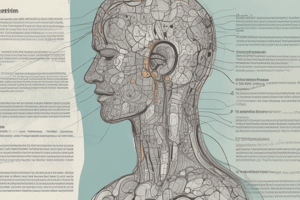Podcast
Questions and Answers
Obsessive-compulsive disorder is classified as which type of psychiatric disorder?
Obsessive-compulsive disorder is classified as which type of psychiatric disorder?
- Anxiety disorder (correct)
- Psychotic disorder
- Personality disorder
- Mood disorder
Where should you begin the primary assessment of a patient displaying a psychiatric issue?
Where should you begin the primary assessment of a patient displaying a psychiatric issue?
From the doorway or from a distance
When assessing a patient with a behavioral issue, what three contributors should you ask about?
When assessing a patient with a behavioral issue, what three contributors should you ask about?
Proper CNS functioning, drug/alcohol use, significant life changes
What is the concern with transporting a patient who is restrained with their hands tied behind their back?
What is the concern with transporting a patient who is restrained with their hands tied behind their back?
Which of the following is a sign/symptom of PTSD?
Which of the following is a sign/symptom of PTSD?
How is a behavioral crisis defined?
How is a behavioral crisis defined?
Which behavioral crisis is most likely to lead to suicide?
Which behavioral crisis is most likely to lead to suicide?
The returning veteran's altered consciousness can help them function under negative conditions.
The returning veteran's altered consciousness can help them function under negative conditions.
As an EMT, what is your main goal in a psychiatric emergency?
As an EMT, what is your main goal in a psychiatric emergency?
In which condition is a patient likely to have a flashback?
In which condition is a patient likely to have a flashback?
Study Notes
Obsessive-Compulsive Disorder (OCD)
- Classified as an anxiety disorder, which is one of the most prevalent mental health disorders.
Primary Assessment
- Start the assessment from a distance, such as the doorway, to assess for potential violent behavior.
Behavioral Issues Assessment
- Evaluate three key contributors:
- Central nervous system function.
- Use of hallucinogenic or other substances.
- Recent significant life changes experienced by the patient.
Restraint Concerns
- Patients restrained with hands behind their back risk positional asphyxia if placed in a prone position during transport.
Post-Traumatic Stress Disorder (PTSD)
- Hypervigilance is a common symptom associated with PTSD, indicating heightened alertness and reactivity.
Behavioral Crisis Definition
- A behavioral crisis occurs when an individual's reaction to events disrupts their ability to perform daily activities.
Suicide Risk Factors
- Depression is identified as the primary factor leading to a higher risk of suicide.
Veterans and Mental Health
- Veterans may exhibit altered states of consciousness, enabling them to function despite adverse conditions they experience.
EMT Goals in Psychiatric Emergencies
- The primary objective is to diffuse or control the situation and ensure safe transport to an appropriate care facility.
Flashbacks in PTSD
- Patients with PTSD are susceptible to experiencing flashbacks, where they relive traumatic events.
Studying That Suits You
Use AI to generate personalized quizzes and flashcards to suit your learning preferences.
Description
This quiz focuses on key concepts from EMT Chapter 23 regarding behavioral health emergencies. It covers topics such as psychiatric disorders, assessment techniques, and more. Ideal for EMT students looking to enhance their understanding of mental health in emergency situations.




